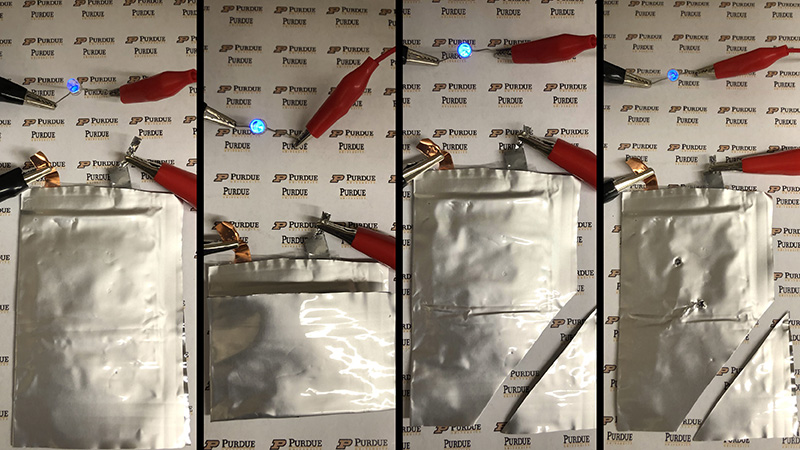March 9, 2023
Purdue engineers create safer solid-state lithium-ion batteries from new composite materials

Batteries made with the new composites remain operational when damaged instead of exploding like traditional batteries
WEST LAFAYETTE, Ind. – Purdue University engineers are making one of the most-used power sources safer and more efficient.
High-voltage, solid-state lithium-ion batteries are the go-to power source for high-end technologies like electric and hybrid vehicles, wearable devices, pacemakers, radio-frequency identification systems and more. One of their most dramatic drawbacks is that they often explode when damaged.
A team led by Vilas Pol, a Purdue professor in the Davidson School of Chemical Engineering, has developed a new composite material that is safer to use in those batteries than traditional solid polymer electrolyte, or SPE, technologies.
Pol’s new, patent-pending composite material improves upon traditional SPE materials in several ways:
- It has a wide voltage window of around 4.8 volts.
- It has an optimized ionic conductivity of around 2.4*10^4 microsiemens.
- It shows excellent thermal stability up to around 330 degrees Celsius.
- It exhibits stability to cell damage, leading to a huge increase in safety.
Pol said traditional SPE materials have other drawbacks.
“They have poor thermal stability, which can cause battery thermal runaway and lead to catastrophic firing,” Pol said. “Their ionic conductivity is limited to low temperatures, which can reduce energy efficiency and lifetime. And low-energy-density batteries can cause quick energy depletion and short operating times of devices, considering the limited space for a battery in electronics or electric vehicles.
“We have further developed advanced electrolytes with fire-retardant molecules as a quasi-solid-state battery, enhancing the lithium-ion battery safety.”
Pol and his team have continued their research to make the material even safer via electrolyte composite optimization, battery overcharging, and nail penetration and thermal abuse testing.
Pol’s research has been published in the November 2020 and July 2021 issues of the peer-reviewed Chemical Engineering Journal. He disclosed the innovation to the Purdue Research Foundation Office of Technology Commercialization, which has applied for a patent on the intellectual property. Industry partners seeking to further develop this innovation should contact William Buchanan, wdbuchanan@prf.org, about reference numbers 2020-POL-68955 and 2023-POL-69972.
Pol’s work on the new composite material has been funded by the Office of Naval Research and Purdue Research Foundation Office of Technology Commercialization’s Trask Innovation Fund.
About Purdue University
Purdue University is a top public research institution developing practical solutions to today’s toughest challenges. Ranked in each of the last five years as one of the 10 Most Innovative universities in the United States by U.S. News & World Report, Purdue delivers world-changing research and out-of-this-world discovery. Committed to hands-on and online, real-world learning, Purdue offers a transformative education to all. Committed to affordability and accessibility, Purdue has frozen tuition and most fees at 2012-13 levels, enabling more students than ever to graduate debt-free. See how Purdue never stops in the persistent pursuit of the next giant leap at https://stories.purdue.edu.
About Purdue Research Foundation Office of Technology Commercialization
The Purdue Research Foundation Office of Technology Commercialization operates one of the most comprehensive technology transfer programs among leading research universities in the U.S. Services provided by this office support the economic development initiatives of Purdue University and benefit the university’s academic activities through commercializing, licensing and protecting Purdue intellectual property. In fiscal year 2021, the office reported 159 deals finalized with 236 technologies signed, 394 disclosures received and 187 issued U.S. patents. The office is managed by the Purdue Research Foundation, which received the 2019 Innovation and Economic Prosperity Universities Award for Place from the Association of Public and Land-grant Universities. In 2020, IPWatchdog Institute ranked Purdue third nationally in startup creation and in the top 20 for patents. The Purdue Research Foundation is a private, nonprofit foundation created to advance the mission of Purdue University. Contact otcip@prf.org for more information.
Writer/Media contact: Steve Martin, sgmartin@prf.org
Source: Vilas Pol, vpol@purdue.edu
